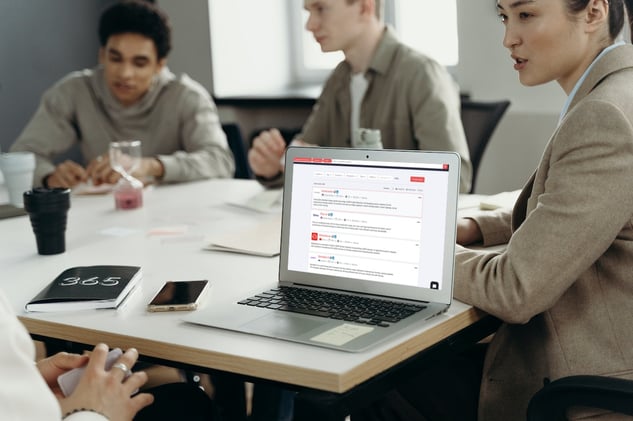Becoming a great director of strategic partnerships is no easy feat. Becoming a director of any kind is a challenge in itself but directing strategic partnerships is a unique role that requires a particular combination of skills, experience, and personality traits that set you apart from the rest. However, with the right mindset and dedication, anyone can achieve greatness in this field.
In this post, we share our guide on what makes an excellent director of strategic partnerships. Whether you’re considering becoming one, or already are and want to excel at managing your partner ecosystem, this blog is for you!
Why do companies need a director of strategic partnerships?
Having a dedicated director of strategic partnerships can help a company achieve a number of important goals. First, it can help to expand the company’s reach and access new markets by leveraging the strengths of other organizations. For example, by partnering with a company that has complementary products or services, a company can offer a more complete solution to its customers and potentially tap into new customer segments.
Additionally, a director of strategic partnerships can help a company remain competitive by staying on top of industry trends and developments. By cultivating relationships with other companies, the director can gain valuable insights into emerging technologies, market shifts, and other factors that impact the company's bottom line.
Overall, a director of strategic partnerships can help a company foster a culture of innovation and collaboration, which can ultimately drive growth and success. By bringing together different organizations and finding ways to work together, a company can achieve more than it would on its own.

What does a director of strategic partnerships do?
The main purpose of a director of strategic partnerships is to identify and develop relationships with external partners that can help their company achieve its business objectives.
The role involves working closely with both internal stakeholders and external partners to develop mutually beneficial partnerships that align with the company's overall strategy. For example, this can involve identifying non-competing organizations that complement each other and can join forces on one particular project, or building a long-lasting partnership that not only brings value to the businesses but also increases value for the customer.
The specific responsibilities of a director of strategic partnerships will vary depending on the company and industry they work in. However, common tasks include:
Identifying potential partners
A director of strategic partnerships must be able to identify potential partners that can help the company achieve its business objectives. This may involve conducting market research, using partner scouting software, attending industry events, and networking with industry professionals.
Building relationships
Once potential partners have been identified, a director of strategic partnerships must work to build strong relationships with them. This may involve meeting with partners to discuss potential opportunities, negotiating partnership agreements, and maintaining ongoing communication.
This process can seem daunting and time consuming because organizations need to gather all the necessary information about each other and prepare properly for the partnership. Building a relationship might also involve running a pilot and testing what’s being offered on a selective audience or for a short period of time.
Developing partnership strategies
A director of strategic partnerships must also develop strategies detailing how their company can best work with external partners. This may involve identifying areas where the company can provide value to partners and developing strategies to leverage partner resources to achieve the company's objectives.
There is no standard process for this and it will typically involve a unique process for each partnership. However, after working in a couple of partnerships, it will become clearer of which processes or at least questions, are repeatable and easily scalable. We always advise documenting your steps, processes, and relationship-building actions to create a standard checklist for use in future relationships.
Managing partnerships
As with all relationships, strategic partnerships between organizations should always be “build and maintain” rather than “build-and-forget”.
Once partnerships have been established, the director of strategic partnerships must work to manage these relationships over time. This will involve monitoring partner performance, identifying areas for improvement, and addressing any issues that may arise.
The challenge here is usually transparency and how to keep all stakeholders aligned. Partner relationship management software can make this much easier, by keeping all relevant information in one centralized hub.
A director of strategic partnerships plays a critical role in helping their company achieve its business objectives by identifying and developing relationships with external partners. By working closely with both internal stakeholders and external partners, they can help their company stay ahead of the curve and achieve long-term success.
What skills and traits do directors of strategic partnerships have in common?
At HYPE Innovation, we meet many great partnership managers and directors of strategic partnerships who work closely with our customer success team and use our HYPE Partnering technology to help them reach their partnership goals.
Based on our own experience, we’ve identified what these individuals all have in common. A great director of strategic partnerships possesses strong communication and negotiation skills, has a deep understanding of business strategy and market trends, and is able to cultivate long-term relationships with partners:
-
Strong communication and negotiation skills
One of the most important skills for a director of strategic partnerships is the ability to communicate effectively with both internal stakeholders and external partners. This includes the ability to listen actively, clearly articulate ideas and strategies, and build rapport with others.
In addition to communication skills, directors of strategic partnerships must also be skilled negotiators. This means being able to identify and articulate the value that your company brings to the table, and negotiating mutually beneficial partnerships that help both parties achieve their goals.
-
Deep understanding of business strategy and market trends
A great director of strategic partnerships also has a deep understanding of business strategy and market trends. This means being able to analyze market data, identify emerging trends, and develop strategies that help your company stay ahead of the curve.
In addition, they must also have a strong understanding of their company's business objectives, and be able to develop partnerships that align with these objectives.
-
Strong relationship-building skills
Finally, a great director of strategic partnerships can cultivate long-term relationships with partners. This means being able to build trust and rapport with others, and being able to navigate complex organizational structures to achieve your goals.
To do this, it's important to be proactive in reaching out to potential partners, and to invest time and resources in building strong relationships with them over time.
How to become a great director of strategic partnerships
If you possess these qualities and are looking to become a great director of strategic partnerships, there are several things you can do to enhance your skills and experience. Here are some tips to get you started:
-
Build a strong network
Building a strong network of contacts is essential for anyone looking to excel in the field of strategic partnerships. This includes both internal and external contacts, and should include individuals across a variety of industries and functions.
To build your network, attend industry events and conferences, join professional organizations, and leverage social media platforms like LinkedIn.
HYPE Innovation regularly organizes a number of great events. Check them out and join the ones you find the most interesting and relevant for you and your industry.
-
Seek out mentors
Having a mentor can be a great way to gain valuable insights and guidance as you navigate your career. Look for individuals who have experience in the field of strategic partnerships, and who are willing to share their knowledge and expertise with you.
-
Develop your business acumen
To be a successful director of strategic partnerships, it's important to have a strong understanding of business strategy and financial analysis. Consider taking courses or pursuing certifications in these areas to enhance your knowledge and skills.
-
Be proactive
Finally, it's important to be proactive in seeking out new partnership opportunities and developing strategies to achieve your company's objectives. Don't be afraid to take risks and think outside the box, and always be willing to learn and adapt as the market evolves.
Becoming a great director of strategic partnerships requires a unique combination of skills, experience, and personality traits. Maybe you tick all of the boxes? If so, are you ready to work toward becoming the best of the best?
While managing strategic partnerships can be a complex task, with the right tools and technology, you can streamline and automate many of the tasks involved in partnership management. That’s why we’ve developed the software platform HYPE Partnering, to simplify and automate the process of managing strategic partnerships.
How does HYPE Partnering help directors of strategic partnerships to excel at their roles?

HYPE Partnering provides a range of features designed to help companies manage their partner ecosystems more effectively. Some of the key features include:
Partner database: HYPE Partnering enables companies to maintain a comprehensive database of their partners, which includes information such as contact details, partnership agreements, and performance metrics.
Collaboration tools: Our platform offers a range of collaboration tools that make it easy for internal stakeholders and external partners to communicate and collaborate on partnership activities. This includes features such as shared calendars, task management, and document sharing.
Performance tracking: HYPE Partnering enables companies to track the performance of their partnerships over time, using metrics such as revenue generated, leads generated, and customer satisfaction ratings.
Automated workflows: Our platform includes a range of automated workflows that can help companies manage their partnerships more efficiently. This includes workflows for tasks such as partner onboarding, deal negotiation, and performance tracking.
Analytics and reporting: HYPE Partnering provides detailed analytics and reporting capabilities, allowing companies to track the performance of their partnerships and identify areas for improvement.
HYPE Partnering can be a powerful tool for companies looking to streamline and automate their strategic partnership management processes. By providing a central platform for managing partnerships and automating many of the tasks involved in partnership management, HYPE Partnering can help companies achieve better results from their partnerships while minimizing the time and resources required to manage them.











